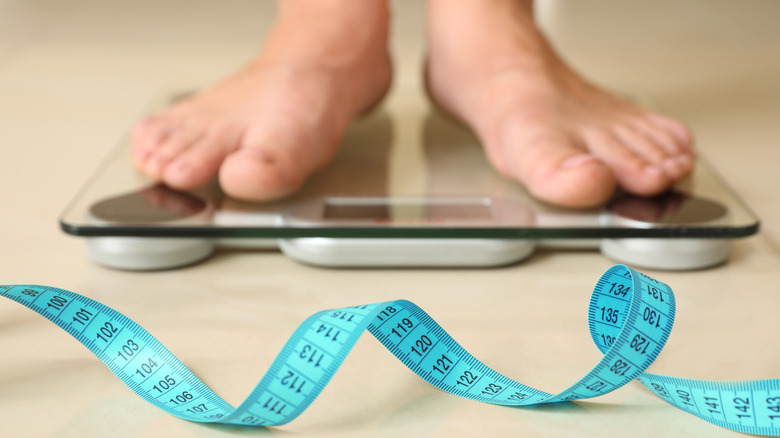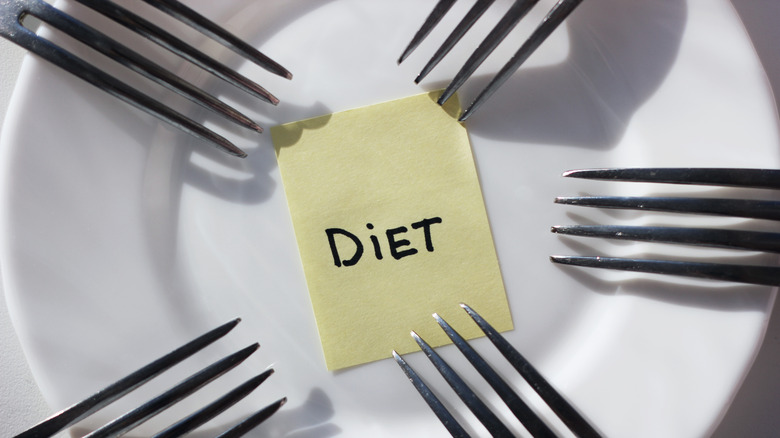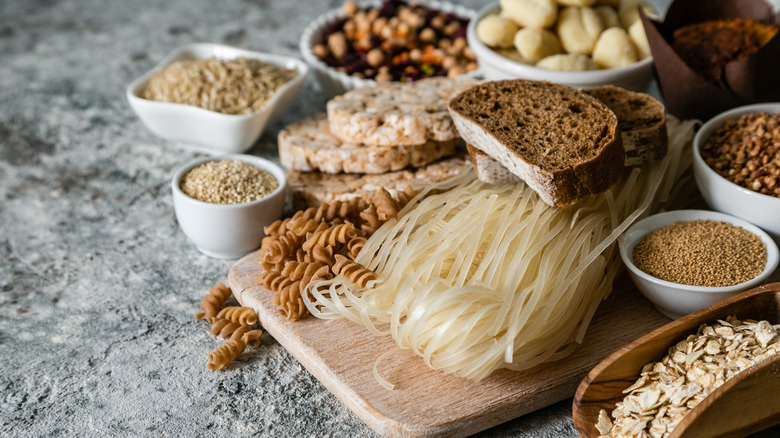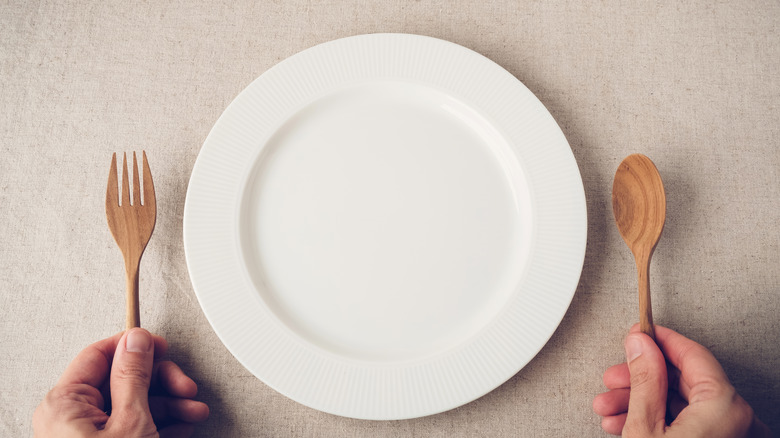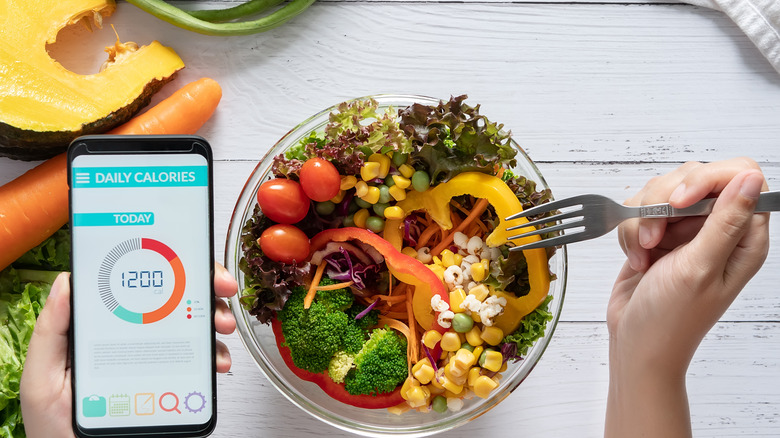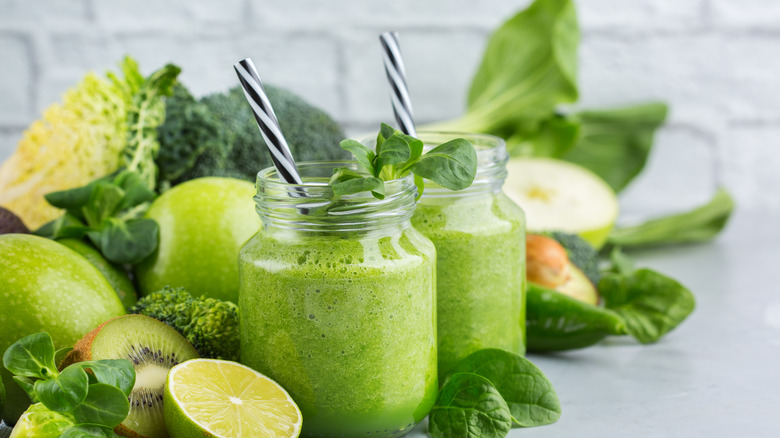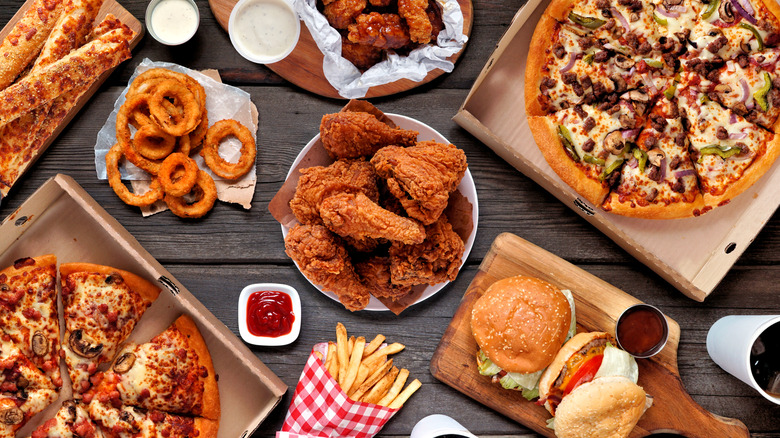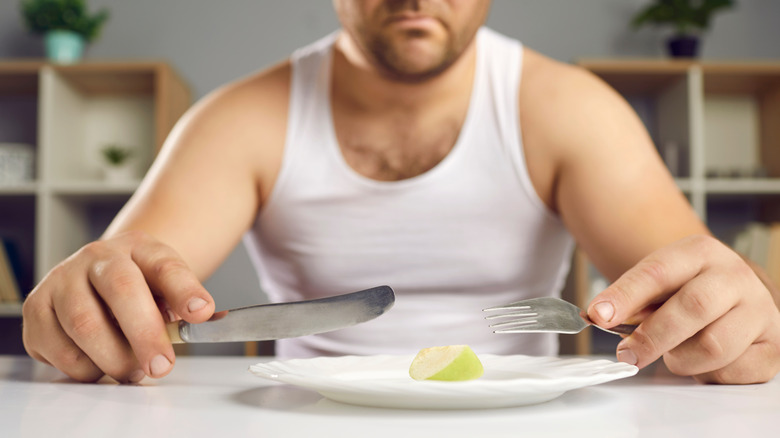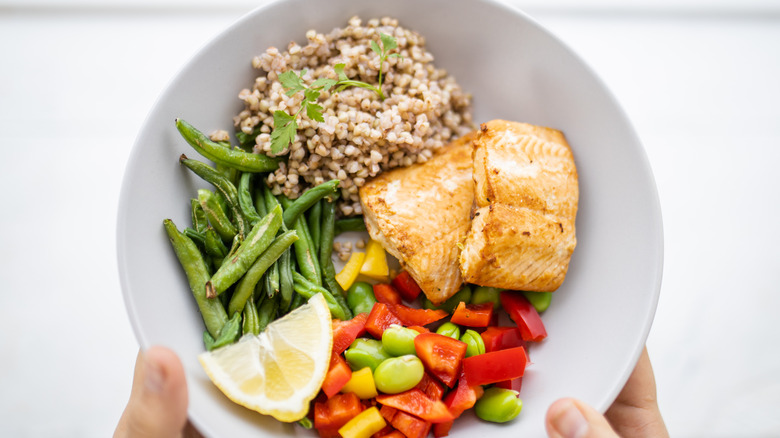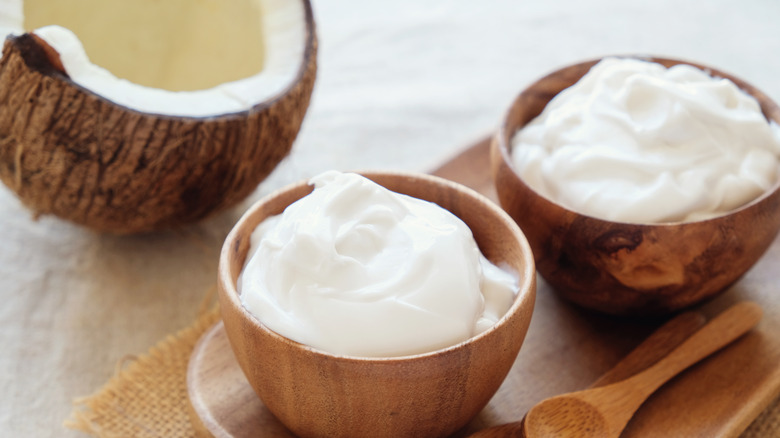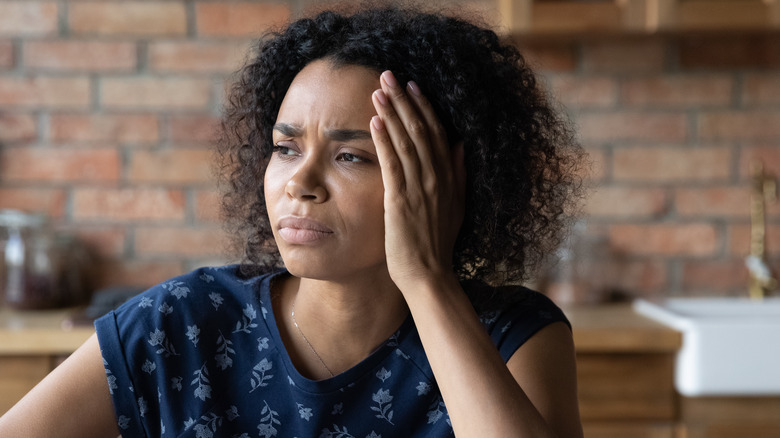Things You're Doing To Lose Weight That Probably Aren't Working
Whether you want to shed some pounds for health reasons, a special occasion, or just to live a healthier lifestyle, losing weight can be a daunting task. Contrary to popular belief, there is no giant catch-all weight loss secret, because each body is different. Your basal metabolic rate, muscle mass, sex, age, and even specific health conditions are all things that affect your body's capability to lose weight (via Everyday Health).
The important thing to note is that weight loss can take time — when done correctly. When you don't fall victim to the "fast or easy" method of dieting and weight loss, you may actually see more long-term success. The end result is a happier, healthier version of you.
We've rounded up some popular diet and wellness tips that you may have heard about, but that probably aren't working. While the things below may have some temporary results, they can sometimes be dangerous — and make you miserable.
Trying out tons of new fad diets
You've probably heard of dozens of these sometimes bizarre trendy diets that promise fast results. Some of these diets, like the grapefruit diet or the cabbage soup diet, focus only on one item of food — meaning you're missing out on other necessary nutrients. Other fad diets like the Military Diet, follow a rigid meal plan limited to items like cottage cheese, hard-boiled eggs, and saltines (via Eat This, Not That).
These diets unsustainable, but research shows they don't work. University of California Los Angeles analyzed 31 different diets and found that 30 to 60% of participants regained all the lost weight back — and sometimes more (via UC San Diego School of Medicine).
The cycle of losing and regaining weight that accompanies fad dieting is also shown to increase the risk of heart disease death by 66%, according to UC San Diego School of Medicine. If that weren't enough to steer you away from fad diets, the nutritional deficiencies, fatigue, and dehydration you may experience with some of these diets that target water weight or fiber might do the trick.
Going gluten free without a medical reason
Gluten-free diets exploded in popularity in recent years. There are now tons of gluten-free products to choose from on supermarket shelves. But many people jumped on the gluten-free train without having any actual medical reason. Those who have celiac disease or a form of the condition called dermatitis herpetiformis should avoid gluten (via Providence Health and Services). Some people may also be sensitive to gluten and have reason to avoid it to prevent gastrointestinal issues.
Otherwise, Providence Nutrition Services says eliminating gluten isn't necessarily the healthier option as it affects your carbohydrate intake. In fact, carbohydrates should make up 55 to 60% of your diet. While you might not think so, gluten-free options sometimes can be unhealthier than traditional carbs because there can lack nutrients like calcium, iron, fiber, and vitamin D. Some products also contain more sugar than their gluten-containing counterparts to make up for lacking taste and texture.
Plus, eliminating a whole food group from your diet when it's not medically necessary sets you up for potential failure if you grow tired of the restrictions (via CNet).
Skipping breakfast and lunch to have a big dinner
This can be a popular one: Skipping a meal to prepare for a "big meal" later in the day. This is a no-no, though, as it increases the likelihood of you overeating at your next meal. When you get to that point of ravenous hunger, your body is unable to work as efficiently to digest the nutrients it needs, according to Prevention. Skipping meals throws your resting metabolism out of whack, meaning you won't burn calories as efficiently either
You may also notice that skipping meals will have you feeling tired or moody, as your blood sugar drops and has you grabbing unhealthy food options out of craving. Doesn't sound enjoyable or worthy of missing a meal.
There is an alternative to skipping meals called intermittent fasting, meaning people only eat during certain hours of the day. Registered dietitian Brooke Alpert told Prevention that when done correctly, intermittent fasting can have weight loss benefits and promote mindful eating.
Counting the calories you take in
Counting calories can be a hard habit to break if it is ingrained into your mind. Experts say this age-old tactic of cutting 3,500 calories to lose a pound may not even be accurate, as it is difficult to have uniform results with so many factors in play (via Harvard Medical School).
Dr. Fatima Cody Stanford, obesity specialist and assistant professor of medicine and pediatrics at Harvard Medical School, recommends "[dropping] the calories notion" because you may digest calories in a different way based on your gut microbiome and your metabolism.
Weight loss via cutting calories also depends on the type of foods you eat. A 2019 study found that when two different groups of people were given meals with the same amount of calories, the group that had ultra-processed food in their meals actually gained weight (via Harvard Medical School). Stanford says the moral of the story is that consuming healthy, natural foods are more important than the specific calorie count.
Overdoing the rigorous workouts
We've all heard that weight loss is part nutrition and part exercise. But overexercising can actually have adverse effects on your body. Experts typically recommend a minimum of 30 minutes a day, but where you should start depends on your level of fitness (via Livestrong). Immediately kicking off with two-hour workouts could lead to injuries and health issues if you are not used to exercising that much.
This notion of compulsive working out can also lead to a serious condition called exercise bulimia, which trades in exercise for food excesses, according to Livestrong. Exercise should also not be used as an excuse to indulge in larger portions or "cheat meals." Eating a large meal after a heavy workout won't necessarily cancel out the food and could lead to weight gain (via Verywell Fit). Make sure your body has the right amount of fuel for your workout so you don't overdo it in your recovery meals.
If you are struggling with an eating disorder, or know someone who is, help is available. Visit the National Eating Disorders Association website or contact NEDA's Live Helpline at 1-800-931-2237. You can also receive 24/7 Crisis Support via text (send NEDA to 741-741).
Taking diet pills or supplements without doctor's orders
Over-the-counter diet pills or supplements are a dime a dozen, but most aren't even effective without proper nutrition or exercise. In fact, they could be dangerous. This is because non-prescription diet pills and supplements aren't subject to the same rigorous safety requirements as prescriptions (via Banner Health). However, the U.S. Food and Drug Administration does monitor products once they are on the market.
One exception is if they are prescribed to you by your medical team. Doctors may prescribe such prescription pills if you haven't been able to lose weight with diet and exercise, you have a body mass index of at least 27, and you have a serious, weight-related medical problem like diabetes or high blood pressure (via Mayo Clinic). In these cases, the prescription weight loss medications can be more effective, especially if coupled with lifestyle changes.
It should be noted that prescription weight loss medications do have some side effects. You should consult with your doctor before adding new medications or supplements to your routine.
Doing 'detox' diets for your body
At one point or another, you've probably thought about doing a "detox" diet. Removing toxins from your body sounds like a good idea, right? In reality, experts say your body does this job all on its own. "The liver is our detoxification machine. It's made to do this," Dr. Thomas Aloia told the University of Texas MD Anderson Cancer Center. "Detoxifying the normal things we eat, breathe and ingest is part of its job and keeps us alive."
While detox products may claim to provide benefits like weight loss, energy boosts, digestion improvements, and reducing your inflammation, one product can't fix all of your overindulgences — especially if they're often. A healthy, plant-based diet with lean protein, whole grains, fruits, and vegetables can provide these same benefits — and more (via UT MD Anderson Cancer Center).
Even though you may lose weight at first from a detox diet, the results will likely be short-lived. Temporary weight loss could be from fluid loss and lean muscle mass as opposed to body fat.
Trying to get your nutrition in liquid form
Liquid diets typically replace multiple meals with meal replacement shakes or fruit or vegetable juices. They can work by decreasing your calorie intake, but they shouldn't be a long-term solution (via WebMD). Liquid diets can be problematic because you may not get enough nutrients like fiber or protein. They can also stunt your metabolism, as it slows to save energy and increases the likelihood you'll gain the weight right back once you start eating solids again.
Soup diets can yield similar results and have more fiber and protein, but also contain high levels of sodium, spiking your blood pressure (via Eat This, Not That). Laxative teas are another liquid-themed diet trick, but inducing more bowel movements also increases the likelihood of dehydration as you lose fluid, not fat.
There are some medical reasons your doctor would recommend a liquid diet. In these cases, mixing liquids with solid foods can be a healthy option. But it is best to get recommendations from your medical team before starting any new diet plan.
Eating frequent smaller meals
Eating more often and in smaller amounts is typically recommended to keep your metabolism working efficiently and prevent overeating at mealtime. But it can also increase the likelihood that you will inadvertently eat too many calories (via Verywell Fit). This is especially a problem if your snacks aren't the healthiest options.
To avoid eating too many high-calorie meals, try eating small, portioned snacks in between larger meals. This way you aren't starving for your larger meals, but you haven't overindulged multiple times in a day. You can meal-prep multiple snacks for multiple days so you don't fall victim to large portion sizes.
You should also be wary of eating more frequently out of boredom. Take note if you are actually hungry. And if not, find something to do that doesn't involve snacking like walking the dog or doing another hobby you enjoy to pass the time.
Being too restrictive with your diet
While getting serious about your nutrition is key for any weight loss journey, you don't want to go too extreme and give yourself too many restrictions. This may sound like a trap, but having a super strict diet plan that eliminates whole food groups or doesn't allow any indulgence could set you up for failure. Instead, experts say you should adapt your nutrition plan to fit your lifestyle and health goals (via Sharp).
Restrictive diets can be unsustainable, therefore making you feel guilty and affecting your self-esteem. Registered dietitian and personal trainer Lauren Manganiello told Eat This, Not That that being too restrictive can cause rule-breaking and you can find yourself overindulging that sweet tooth instead of allowing yourself a small treat.
Plus, having a very strict diet plan can lead to some negative repercussions like headaches, fatigue, anxiety or depression, and feeling too hungry. Your diet shouldn't affect your day-to-day life, meaning you shouldn't avoid going to dinner with friends because of your diet, according to Sharp
Not regulating portion sizes of healthy foods
You may think that if you're eating healthy foods that it doesn't matter how much you actually eat. Unfortunately, whether it's a burger and fries or veggies and dip, portion size still matters while you're trying to lose weight. This is because some healthy foods are actually calorie-dense even though they contain protein, fiber, and other essential nutrients (via Eat This, Not That).
Plating can also be deceiving, meaning you don't realize how big your portions are. The "plate method," however, can be helpful. This calls for filling half your plate with vegetables, a quarter with protein, and the last quarter with healthy carbs (via Verywell Fit). There are also serving sizes listed on food labels, which are actually different from portion sizes — confusing, right?
So what size should your portions be? It depends, but the U.S. Department of Agriculture provides dietary guidelines to give you a good starting point.
You're hyperfocused on low-fat or sugar-free foods
Think you're choosing the best food for your diet with low-fat or sugar-free foods? Think again. Sometimes those low-fat or sugar-free options aren't the best choice for your waistline. One study by Harvard University published in The Lancet found that compared to similar diets like low-carb or higher-fat diets, there was no evidence that low-fat diets were more successful for long-term weight loss.
And not all high-fat foods are necessarily bad. Eating foods like avocados, eggs, cheese, and olive oil in moderation can be far healthier than, say, fat-free ice cream. Additionally, the artificial sweeteners in sugar-free products can actually be even worse for you than sugar itself, as they are chemically treated. Artificial sweeteners have also been linked to an increased risk of some cancers, blood sugar issues, and stomachaches (via Food Network). The bottom line: Small amounts of regular sugar can be cycled into your diet in moderation — unless you have other medical reasons to use sugar-free products containing artificial sweeteners.
Ignoring other aspects of your overall health and wellness
Did you know that mental health could play a role in the number on your scale? Stress and anxiety can cause you to seek out comfort food that may have extra calories, as well as make it difficult to get off the couch for a workout (via Verywell Fit). Try reducing your stress with meditation, yoga, or see a professional if needed.
Good sleep is also a necessity for weight loss. Research has shown a link between lack of sleep and obesity, as well as a negative impact on the body's metabolism (via Mayo Clinic). Those who slept four hours a night had more cravings for high-calorie, high-carbohydrate foods than the people who got 10 hours of shut-eye. These findings could be a result of grogginess and fatigue, which is not a good recipe for an exercise routine.
"Seven to nine hours seems to be a pretty consistent time frame for when we get the best repair and where we have the least relationship to obesity. In other words, it's kind of that nice window where you don't oversleep, you don't under sleep, and there's enough repair that takes place," Shawn Arent, the director of the Center for Health and Human Performance at Rutgers University, told Business Insider.
Not consulting with a nutrition professional or your medical team
Dieting may make you feel isolated and frustrated, especially if you feel like you're on your own trying to figure out how to get those pounds off. However, registered dietitian nutritionists and your medical team can be great resources to help you develop a diet plan specific to your individual health needs.
Forming a supportive team around you that is full of people educated in nutrition and health can be a gamechanger. Registered dietitian nutritionists can provide you information on the best way to change your diet, promote physical activity, and allow you to still indulge in your favorite foods (via Academy of Nutrition and Dietetics ). With guidance, you can learn how to discern healthy food options from unhealthy options on your own so you are empowered to make and maintain lifestyle changes even after the pounds come off.

